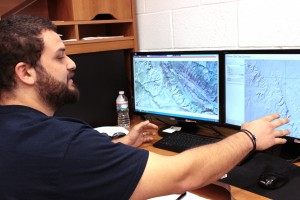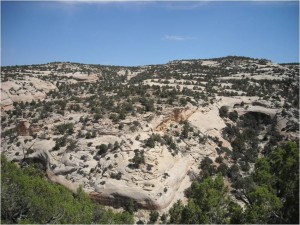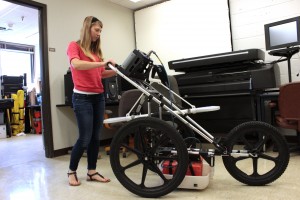Finding Oil in Texas is Easy, Just Look on the Ground

Dave Fehling / StateImpact
Unal Okyay at the University of Houston analyzes satellite images of Utah indicating oil & gas seeps
It’s part of the popular lore of how to get rich by finding oil: all you have to do is look for it bubbling to the surface. That’s actually how some of the biggest oil fields were discovered many years ago.
Now, scientists are again trying to find oil and gas deposits by looking for them at the surface, albeit with sophisticated satellite and digital technology.
“We’re using hyperspectral satellite remote sensing,” explains Dr. Shuhab Khan, sitting in his geology laboratory at the University of Houston. “We have done this in Texas, North Texas,we are still doing some sites in Oklahoma.”
Khan has been working for years on perfecting a method of oil exploration that uses images of the earth’s surface taken by NASA satellites. Khan and a team of students use computers to sort through satellite images to find anomalies that are linked to where oil and gas is seeping to the surface. Called microseeps, these tiny hydrocarbon leaks can cause chemical changes in plants, soil and rocks. The changes are sometimes so subtle only a computer can tell.
But in some cases, the changes to the earth’s surface are more dramatic.

University of Houston
Rock outcroppings in Utah that researchers say are bleached white by hydrocarbons
“You would see the manifestations of the microseepages; bleaching of sandstone, changing the color of the sandstone from red to white,” said University of Houston graduate student Unal Okyay.
Microseepages are unlike the Hollywood depictions of how oil millionaires got their starts by spotting crude oozing to the surface. Instead, microspeepages are often no more than vapors that over many years have caused rocks to change color or vegetation to grow differently.
Khan and his researchers are digitally documenting those anomalies at known oil and gas fields which will then allow them to know exactly what to look for in satellite images of potentially millions of acres of land that so far hasn’t been tapped for oil & gas.
“That’s the beauty of remote sensing , we can see very large areas in a very short time,” said Khan. By contrast, conventional seismic testing looks at far smaller areas and reveals geologic formations favorable for oil & gas.
“Seismic surveys and a lot of other surveys are very expensive, they cannot do the whole area. But with remote sensing we can cover the whole country,” said Khan.
Could it be the holy grail of oil exploration?

Dave Fehling/StateImpact
Besides satellite images, geology research students gather data on the ground. Kirstie Haynie at the University of Houston with ground penetrating radar "stroller"
“This whole field of geochemical exploration using microspeepage is still somewhat controversial,” said Deet Schumacher, a petroleum geologist in New Mexico who has worked for years with big oil companies on geochemical research.
For example, he says while he’s talked with oil & gas companies that use hydraulic fracturing, none have committed to incorporating the seepage-sensing technology. But Schumacher says they should because he contends it can dramatically increase the chance of finding black gold instead of a dry hole.
“The likelihood you’re going to make a successful well is almost double,” said Schumacher whose 2010 paper on the subject you can read here.
The big oil companies have been involved in hyperspectral research globally for over a decade but some are reluctant to reveal much about it. In an email to StateImpact, ExxonMobil said “we consider all of our satellite capability to a competitive advantage and therefore not something we are discussing publicly.”

